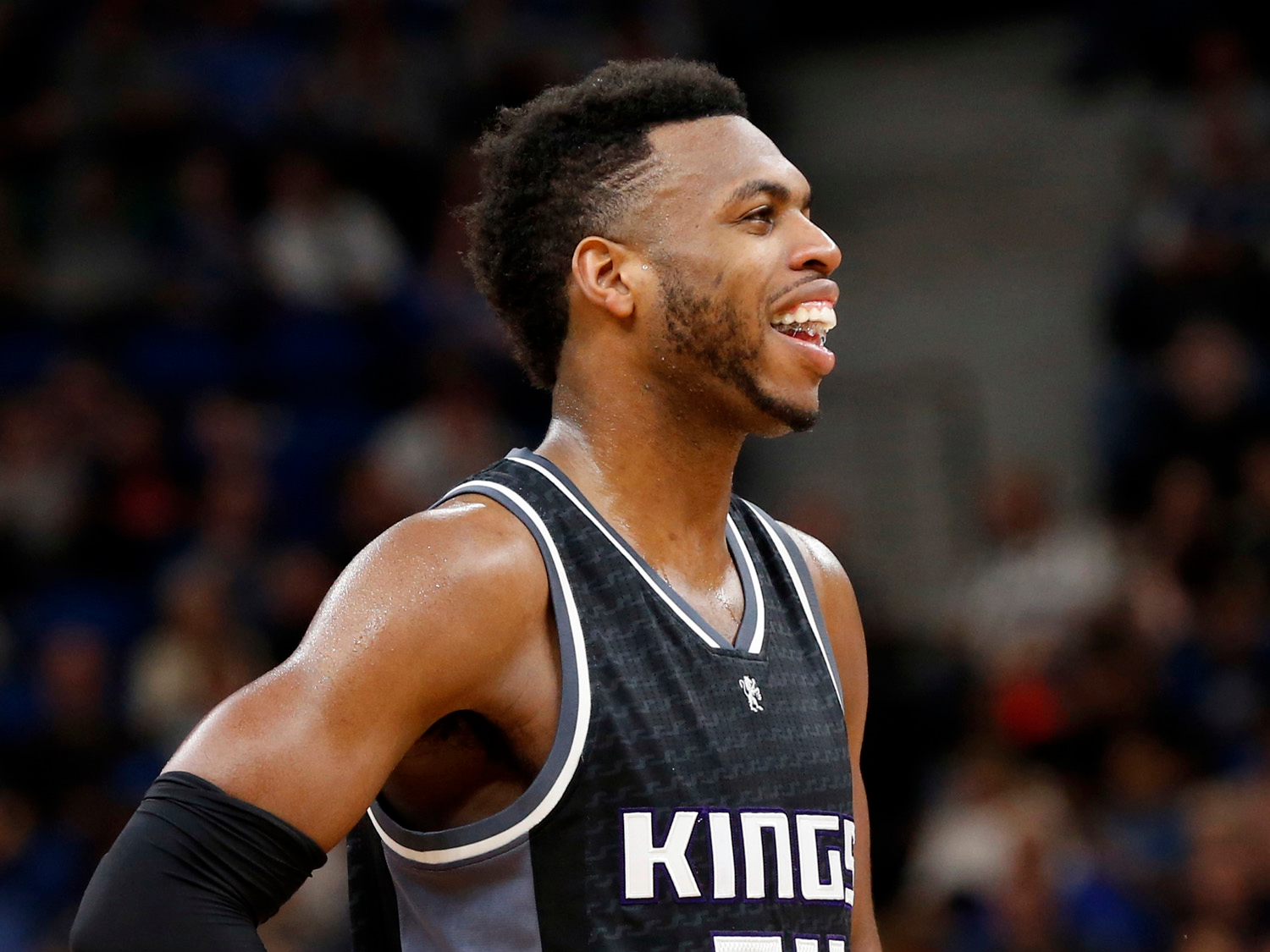The Sacramento Kings were widely criticized in February when they traded DeMarcus Cousins for a meager return, blowing up what was already a rebuilding project.
But five months later, the Kings, the distraught and frequently dysfunction franchise, appear to be heading in the right direction thanks to some savvy moves.
The Kings haven’t made the playoffs in 11 years or posted over 40 wins in that time, and that likely won’t change this season. But there is actually hope for the team that suddenly has a collection of intriguing young talent and respectable veterans to guide them.
The centerpiece of the Kings’ return for DeMarcus Cousins was Buddy Hield, the 23-year-old No. 6 pick in the 2016 draft. Hield did not shine in New Orleans and the consensus is that it’s hard for older rookies to develop into superstars.
Hield didn’t blow anyone away in Sacramento, but he was solid, posting 15 points per game on 48% shooting, 42% from three, with four rebounds per game after the All-Star break. Some of those numbers are hollow, as the Kings went just 8-17 after the break, but they were borderline competitive with Hield on the floor, getting outscored by only four points per 100 possessions, a tolerable figure, all things considered. The Kings also got promising minutes from young athletic players like Willie Cauley-Stein and Skal Labissiere.
But the Cousins trade also paid off in that it gave the Kings another first-round pick in a deep and talented draft. After the 76ers swapped picks with the Kings, Sacramento ended up with the fifth and tenth picks. They took Kentucky point guard De'Aaron Fox with the fifth pick, then traded No. 10 to the Blazers in return for two picks that they used on UNC wing Justin Jackson and Duke big man Harry Giles.
Draft night was considered a win for the Kings. Fox was considered by some to be the best point guard in the draft, Jackson was a savvy, steady wing at UNC who played solid defense and improved his three-point percentage every year, and Giles was considered one of the top prospects in the country before two knee injuries slowed his growth at Duke. Had Giles been healthy enough to show his considerable promise, some experts believed he would have been a top-five pick. The Kings got him at No. 20.
In essence the Kings got a little bit of everything in the draft - a seemingly sure-fire prospect, a steady player who could develop into a solid NBA role player, and a project big man with huge upside but a real potential downside, a worthwhile risk. ESPN's Chad Ford gave the Kings an "A" for the draft; Sports Illustrated's Andrew Sharp gave them an "A+".
To fill out this roster that features eight first- and second-year players, the Kings have also made some strong moves in free agency. Before free agency opened, ESPN's Zach Lowe reported that the Kings were considering tossing "huge money" at the biggest free agents, just to help their chances at winning and to bolster a young roster. The Kings did that, in a sense, but also spent fairly responsibly.
The Kings signed George Hill, a strong, steady, defensive-minded point guard, to a three-year, $57 million deal, Zach Randolph to a two-year, $24 million contract, and Vince Carter to a one-year, $8 million contract.
Some may scoff at the combined money being paid to three 30-and-older players who are unlikely to push the Kings toward playoff contention. The Kings won't have max-level cap space next season (when few other teams will have cap space at all), but it may not be a big deal, as Sacramento isn't a prime free-agent destination.
What the Kings can do this season is continue to tank while also letting their handfuls of young players learn under talented, respected veterans like Hill, Randolph, and Carter. Those three veterans can help the Kings at least function on the floor while also showing the youngsters the ropes, both on the court and off of it.
It's too early to declare the future bright for the Kings - any promising rebuild needs at least one sure-fire superstar and several promising contributors to pair with him. Perhaps Fox and Hield can represent that hope, but there needs to be a larger sample size.
But for the first time in a long time, there's a direction for the Kings. If they've nailed any of their draft picks, they can let them grow under some solid veterans, and by the time Hill and Randolph and co. are out of the picture, those young players may be ready to take over and perhaps attract real talent to come play with them.

